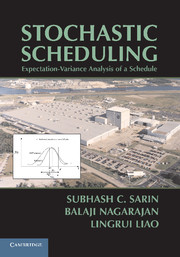Book contents
Preface
Published online by Cambridge University Press: 05 July 2014
Summary
Scheduling is a decision-making process that is commonly encountered in practice – in both production and nonproduction-related environments. The effectiveness of a schedule depends on how well it performs in the environment for which it is designed. For an environment that involves a stochastic element, which is more often the case in practice, a typical approach presented in the literature has been to determine a schedule that optimizes the expected value of a performance measure. However, optimizing merely the expectation of a performance measure for a schedule is not enough for use in such an environment because variability of the measure plays an important role in influencing the performance of the schedule. It is, therefore, essential that a schedule be selected for implementation that has suitable values for both the expectation and variance of the performance measure in consideration. In this book, we present methodologies for determining such a schedule, and in this respect, this book is different from the other books on scheduling.
The book is organized as follows. In Chapter 1, we focus on the impact of uncertainty (variability) in scheduling, and the need for efficient modeling of stochastic scheduling problems and for devising effective scheduling strategies to counter the impact of variability. We specifically highlight the prevalence of variability in job processing times and elicit the issue of neglecting variance in schedule optimization and the significance of considering variance. Furthermore, we enunciate the need for a comprehensive analytical evaluation of the expectation and variance of different performance measures.
- Type
- Chapter
- Information
- Stochastic SchedulingExpectation-Variance Analysis of a Schedule, pp. xi - xiiPublisher: Cambridge University PressPrint publication year: 2010

